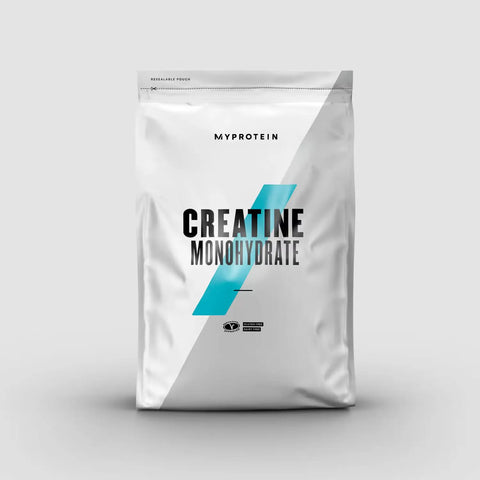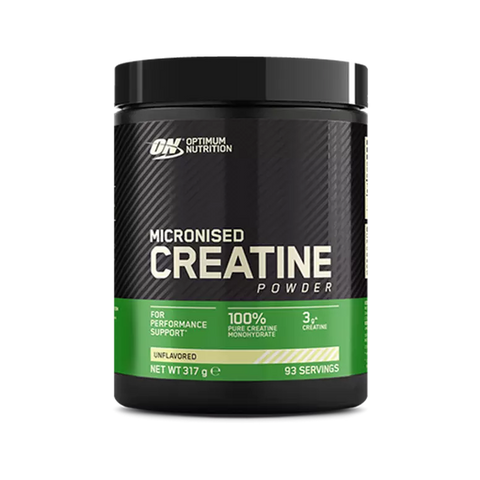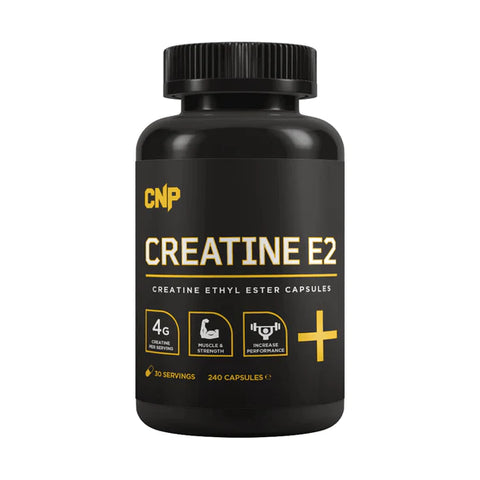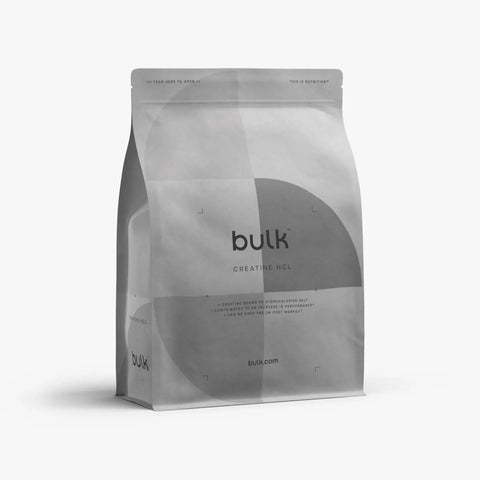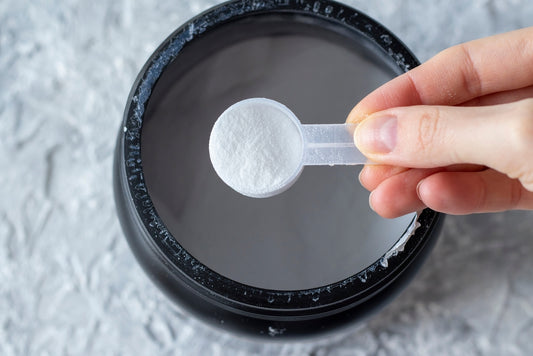Unlocking the Potential of Creatine for Everyone
When you think of creatine, images of bodybuilders and elite athletes might spring to mind. But what if we told you that creatine, one of the most researched and celebrated supplements in the fitness world, is not just for the fitness elite? In fact, it holds a treasure trove of benefits for anyone looking to enhance their health, fitness, and overall well-being.
Creatine is a powerhouse supplement that can play a crucial role in improving physical performance, boosting cognitive function, and offering health benefits that extend well beyond the walls of a gym. You could be an athlete striving for peak performance, a gym-goer just looking to add an edge to your workouts, or simply someone interested in improving their overall health. It doesn't matter, creatine could be the key you've been searching for.
In this piece, we'll dive into the word of creatine, we'll explore its science, unravel its benefits, and debunk common myths, making it clear why creatine is for everyone.
The Science Behind Creatine
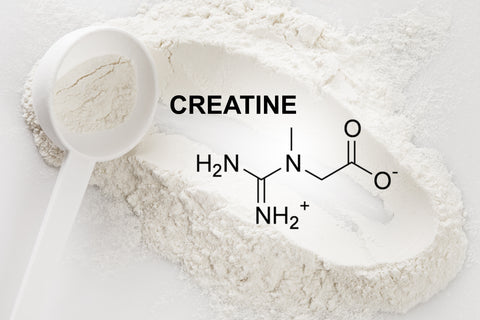
How Creatine Fuels Your Body
At its core, creatine is a naturally occurring compound found in our bodies, primarily in muscle cells. It plays a pivotal role in the production of energy during high-intensity, short-duration exercises like sprinting or weight lifting. But how does this translate into benefits for not just athletes, but also everyday health enthusiasts?
The Role of Creatine in Muscle Energy
Creatine's primary job is to increase the stores of phosphocreatine in your muscles. Phosphocreatine aids in the formation of adenosine triphosphate (ATP), the key molecule your cells use for energy. During intense exercise, ATP breaks down to release energy. Creatine supplements boost the phosphocreatine levels, allowing your body to produce more ATP. This means more fuel for your muscles during workouts, leading to increased strength, power, and endurance.
Beyond Muscle: Creatine's Systemic Effects
Now this is the best part - While it's well-known for its muscle-boosting abilities, creatine's influence extends to other areas too. Research suggests that it can benefit cognitive function, especially in situations of sleep deprivation or mental fatigue. This is crucial not just for athletes, but for anyone who faces daily mental challenges.
Moreover, creatine has been studied for its potential to aid post-exercise recovery, reducing muscle damage and inflammation, and even playing a role in preventing sports-related concussions. This makes it a valuable ally in your overall health and wellness journey, regardless of whether you're lifting weights at the gym or juggling tasks in your daily life.
By understanding the science behind creatine, we can appreciate its vast potential. It's a supplement that enhances both physical and mental performance.
Types of Creatine Supplements
This is where it can get confusing for many people. So if you're looking for a straightforward answer and want to skip the detailed comparison, I completely understand! The key takeaway is that Creatine Monohydrate is the most researched, most commonly used, and generally considered the gold standard in creatine supplements. If you're satisfied with that, feel free to jump ahead to the next section. But if you're curious about the other types and what they offer, keep reading for a deeper dive into the different types of creatine.
Navigating the Creatine Landscape: Choosing the Right Type for You
Creatine comes in various forms, each with its own set of characteristics and benefits. Understanding these differences is key to selecting the type that best aligns with your health and fitness goals, whether you're a seasoned athlete or someone stepping into the realm of supplements for the first time.
Creatine Monohydrate: The Gold Standard
Creatine monohydrate is the most researched and widely used form of creatine. It has a strong track record for safety and effectiveness in increasing muscle mass, strength, and exercise performance. Its affordability and availability make it a popular choice for a wide range of users. One personal observation I've made with Creatine Monohydrate is its solubility in cold water – or rather, the lack thereof. It doesn't dissolve quickly in cold liquids, which can be a bit of a hiccup if you're mixing it on the go. A simple workaround that I've found effective is to mix it into warm liquids. You can even use hot beverages like tea or coffee, and it dissolves completely without altering the taste much. This little trick has made my creatine routine much smoother and more enjoyable.
Micronized Creatine: Enhanced Solubility
Micronized creatine is essentially creatine monohydrate that's been processed to reduce the particle size. This finer powder mixes more easily with liquids and may be easier on the stomach for some users. If you've experienced digestive issues with regular creatine monohydrate, micronized creatine could be a more comfortable alternative.
Creatine Ethyl Ester: A Different Approach
Creatine ethyl ester is a form of creatine that's attached to an ester, a compound that is supposed to increase its absorption into your body. However, research on its effectiveness compared to creatine monohydrate is mixed. Some users prefer it for its potential for lower bloating and quicker absorption.
Buffered Creatine: pH-Adjusted
Buffered creatine is designed to be less acidic than creatine monohydrate, which theoretically means it should be better absorbed by your body. However, studies have not conclusively shown significant differences in effectiveness when compared to creatine monohydrate.
Creatine Hydrochloride (HCL): Enhanced Solubility
Creatine HCL is made by attaching hydrochloride groups to creatine molecules, which increases its solubility in water. This may result in a lower required dose and potentially less stomach discomfort. However, more research is needed to fully understand its benefits over creatine monohydrate.
And there we are! While creatine monohydrate remains the most popular and well-studied form, the variety of options available means there's likely a creatine supplement out there that fits your individual needs and preferences. Remember, the best type of creatine is the one that aligns with your health goals and feels right for your body.
Why Everyone is Talking About Creatine: A Closer Look at Its Advantages
Creatine is a game-changer for a wide array of individuals, from hardcore gym enthusiasts to those simply seeking a healthier lifestyle. Let’s explore the many benefits that have made creatine a staple in many health and fitness regimens.
Enhanced Athletic Performance
The most well-known benefit of creatine is its ability to boost athletic performance. This is particularly true for activities involving quick bursts of energy, like sprinting or lifting weights. By increasing ATP production, creatine helps athletes achieve higher levels of power and endurance, making it a favorite among those looking to push their limits.
Muscle Mass and Strength Gains
Creatine is renowned for its role in promoting muscle growth. Regular supplementation, combined with resistance training, has been shown to increase muscle mass more effectively than training alone. This is not only beneficial for athletes but also for anyone interested in maintaining a strong and healthy body as they age.
Cognitive Benefits
An often overlooked aspect of creatine is its potential cognitive benefits. Studies have indicated that creatine supplementation can improve memory and intelligence tests under certain conditions, such as sleep deprivation or cognitive stress. This makes it an intriguing supplement for students, professionals, and anyone looking to maintain mental sharpness.
Supports Overall Health
Beyond the muscles and the mind, creatine has broader health implications. It may play a role in preventing various health conditions, improving bone density, and even aiding in glucose metabolism. This broad spectrum of benefits makes creatine an appealing supplement for anyone interested in a holistic approach to health and wellness.
How to Use Creatine Effectively
Maximizing the Benefits of Creatine in Your Routine
To reap the full benefits of creatine, it's important to understand how to use it effectively. Here are some key tips and best practices:
Recommended Dosages
Typically, a creatine regimen starts with a loading phase of 20 grams per day for 5-7 days, followed by a maintenance phase of 3-5 grams daily. However, some prefer to skip the loading phase and start with the maintenance dose, which is also effective but may take longer to see results. For me, I decided to skip the loading phase and began with a daily dose of 3 grams. I found this to be a simpler and more manageable routine, especially since my gym training times vary. I take my dose every morning, which helps maintain consistency in my supplementation. This approach has worked well for me, demonstrating that effective creatine use can be tailored to fit individual schedules and preferences.
Timing Your Intake
While there's debate about the best time to take creatine, studies suggest that taking it close to your workout time, either before or after, might be slightly more beneficial than taking it at other times of the day.
Stay Hydrated
Creatine increases the water content in your muscle cells, so staying well-hydrated is crucial when supplementing with creatine to maximize its effectiveness and prevent potential side effects like cramping.
Creatine Cycling
Some users believe in cycling on and off creatine, although research hasn't shown this to be necessary. Consistent, long-term use appears to be safe and effective for most individuals.
Diet Considerations
A balanced diet, particularly one high in protein, can complement the effects of creatine. Since creatine is found naturally in meat, vegetarians and vegans might notice more significant effects from supplementation.
By following these guidelines, you can make the most out of your creatine supplementation and ensure that it effectively supports your fitness and health goals.
Common Myths and Misconceptions About Creatine
Separating Fact from Fiction in the World of Creatine
Creatine is surrounded by numerous myths and misconceptions. Let's address and debunk some of the most common ones:
Myth 1: Creatine Causes Kidney Damage
One prevalent myth is that creatine supplementation harms the kidneys. However, for healthy individuals, there is no scientific evidence to support this claim. It's always recommended, though, that individuals with pre-existing kidney conditions consult their doctor before starting creatine.
Myth 2: Creatine Leads to Water Retention and Bloating
While creatine can increase water content in muscle cells, this doesn't necessarily equate to uncomfortable bloating or water retention. This effect is often minimal and can contribute to muscle growth and improved appearance.
Myth 3: Creatine Is a Steroid
Creatine is sometimes mistakenly classified as a steroid. It's important to clarify that creatine is a naturally occurring compound found in food and in our bodies, not an anabolic steroid.
Myth 4: Creatine Is Only for Male Athletes
Creatine is beneficial for both men and women, and its advantages extend beyond the realm of elite athletes to anyone interested in improving their health and fitness levels.
Myth 5: Immediate Results Are Guaranteed
Creatine doesn't work overnight. While some people may experience rapid improvements, for most, the benefits accumulate over time with consistent use.
By understanding and dispelling these myths, we can approach creatine supplementation with a clearer perspective, focused on its true benefits and proper usage.
Side Effects and Safety Considerations
Understanding the Safety Profile of Creatine
While creatine is widely considered safe for most individuals, it's important to be aware of potential side effects and safety considerations:
Hydration and Kidney Function
As creatine can increase water retention in muscles, it's crucial to stay hydrated. There's no evidence that creatine harms the kidneys in healthy individuals, but those with pre-existing kidney issues should consult a healthcare provider before using it.
Digestive Discomfort
Some people may experience digestive discomfort, such as bloating or stomach cramps, particularly during the loading phase. Switching to a lower dose or a different type of creatine can often mitigate these effects.
Interaction with Medications
Creatine may interact with certain medications. If you're on medication, especially those affecting kidney or liver function, it's advisable to talk to a doctor before starting creatine supplementation.
Age Considerations
While creatine is popular among athletes of all ages, the safety and efficacy for children and adolescents are less understood. It's generally recommended for adults over 18.
Long-Term Use
Long-term effects of sustained high-dose creatine use are still being studied. However, current research supports the safety of long-term use at recommended doses, at least up to 5 years.
Being informed about these aspects can help ensure a safe and effective experience with creatine supplementation.
Integrating Creatine with Other Supplements
Creating a Synergistic Fitness Regimen
Combining creatine with other supplements can enhance your fitness and health results. Here's how to integrate creatine effectively into your broader supplement strategy:
Creatine and Protein
Pairing creatine with protein, especially whey protein, can augment muscle growth and strength gains. This combination is particularly effective post-workout.
Creatine and Carbohydrates
Consuming creatine with a carbohydrate source can increase muscle retention of creatine. Carbohydrates spike insulin levels, which in turn helps shuttle creatine into the muscles more efficiently.
Creatine and BCAAs (Branched-Chain Amino Acids)
Mixing creatine with BCAAs may offer enhanced muscle recovery and growth benefits, making it a popular choice for serious fitness enthusiasts.
Creatine and Caffeine
The interaction between creatine and caffeine is debated. Some studies suggest they may counteract each other's benefits, but more research is needed. If you consume both, consider spacing out their intake.
Creatine and Beta-Alanine
Beta-Alanine, when combined with creatine, can lead to greater increases in muscle carnosine levels, potentially enhancing exercise performance and muscle endurance.
Remember, when adding supplements to your regimen, it's essential to consider your overall health, dietary needs, and fitness goals. Consulting with a healthcare provider can ensure that your supplement strategy is safe and effective.
Embracing Creatine for Enhanced Health and Performance
As we've explored all things creatine, you should now know that it's a supplement for everyone. Its benefits extend to enhancing cognitive function, supporting overall health, and improving fitness for people from all walks of life. Whether you're looking to boost your gym performance, maintain your health as you age, or simply optimize your body's functioning, creatine offers a safe and effective solution.
Remember, the key to successful supplementation is finding what works best for you. If you're ready to enhance your health and fitness journey, consider incorporating creatine into your regimen.
Explore more ways to enhance your physical health here.

